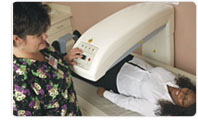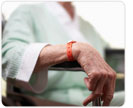
In the later stages of life both men and women can suffer from the onset of a weakening of bone density. This loss is at a fractional percentage rate per year, but can be seen to occur more occur more rapidly in menopausal women who are suffering from an imbalance of estrogenic hormones. The significant impact of a loss of bone mineral density or BMD is the onset of fractures, which can be both particularly dangerous.
Menopause symptoms occur in middle aged women as a direct result of a loss of estrogen hormones and recent studies have been carried out in order to further monitor the risk of bone mineral loss and osteoporosis in women. Such a loss is measured by dual-energy x-ray absorptiometry or DXA and research now believes that repeat testing with this system can allay this risk.
This clinical research was carried out in order to judge whether testing women frequently for bone mineral density assisted in assessing the risk of bone fracture in menopausal women after the first test. Nearly 9000 women were tested for their bone mineral density for a second time in order to test if this increased the effectiveness of detecting the risk of fractures.

Research found that menopausal women who had increased in weight were more susceptible to a lessening in bone mineral density and that further study in this regard would be useful. As one of the 34 menopause symptoms weight gain, caused by a reduction in estrogen hormones, increases the risk to menopausal women. The imbalance of such hormones is sometimes addressed by phytoestrogenic herbs or hormone replacement therapy.
This clinical study, one of the biggest of its kind showed that whilst repeat testing can help mitigate the onset of one of the major factors of a decrease in bone mineral density: weight gain. This symptom, caused by an imbalance in estrogen hormones was found to help in detecting the onset of a weakening of bone density as the weight in most people fluctuates. Overall however such repeat testing was found not to be conclusively beneficial as each measurement of bone mineral density, carried results independent of previous tests.